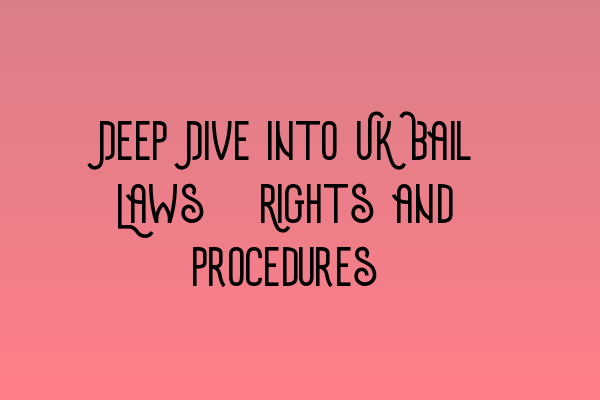Deep Dive into UK Bail Laws: Rights and Procedures
When it comes to dealing with the criminal justice system in the UK, understanding the bail laws and procedures
is crucial. Bail is the temporary release of an accused person from custody while they await trial or other legal
proceedings. It is essential to have a solid understanding of the rights and procedures related to bail to ensure
fair treatment and protection of individual liberties. In this article, we will take a deep dive into the UK bail
laws, covering the essential aspects that you should know.
What is Bail?
Bail is a legal mechanism that allows an accused individual to be temporarily released from custody under certain
conditions. It is designed to strike a balance between protecting the rights of the accused and ensuring public
safety. When granting bail, the court imposes conditions that the accused must follow until their trial or
hearing. These conditions may include reporting to the police station regularly, surrendering travel documents,
or refraining from contacting certain individuals.
Rights Related to Bail in the UK
Individuals in the UK have certain rights when it comes to bail. These rights ensure that the bail process is fair
and transparent. The rights related to bail include:
- The right to be released on bail, unless there are substantial grounds to believe that the accused will fail
to surrender to custody, commit an offense while on bail, interfere with witnesses, or obstruct the course of
justice. - The right to be informed of the reasons for being denied bail. This allows the accused to understand why bail
has been denied and potentially challenge the decision. - The right to a bail hearing within a reasonable time. It is essential for the court to review the need for
continued detention periodically. - The right to legal representation during the bail proceedings. Having legal counsel is crucial for ensuring a
fair process and protecting one’s rights.
Bail Procedures in the UK
The bail procedures in the UK involve several steps. Let’s take a look at the typical process:
- Initial Arrest: When a person is arrested, the police have the power to grant bail at the police station. If
the police decide not to grant bail, the accused will be held in custody until their first court appearance. - First Court Appearance: The accused will be brought before a court, usually within 24 hours of their arrest.
During this hearing, the court will decide whether to grant bail based on the circumstances of the case and
the factors mentioned earlier. - Bail Conditions: If the court grants bail, it will impose certain conditions that the accused must comply with.
These conditions are intended to ensure the accused’s attendance at court and public safety. - Breach of Bail Conditions: If an accused person fails to comply with the bail conditions, they may be arrested
again and face additional charges for breaching bail. - Change in Bail Conditions: In certain situations, the accused may apply to the court for a change in bail
conditions. This could be due to a change in circumstances or a request to vary the conditions. - Conclusion of Trial: The bail period ends upon the conclusion of the trial. If the accused is acquitted, they
will be released. If convicted, the court will proceed with sentencing.
Conclusion
Understanding the bail laws and procedures in the UK is essential for anyone involved in the criminal justice
system. Knowing your rights related to bail can help you navigate the process effectively and ensure fair
treatment. If you require further assistance or legal representation regarding bail matters, SQE Criminal Law &
Practice Law UK can help. Contact us for expert guidance.
Related Articles:
SQE 1 Practice Exam Questions
SQE 1 Practice Mocks FLK1 FLK2
SQE 2 Preparation Courses
SQE 1 Preparation Courses
SRA SQE Exam Dates
